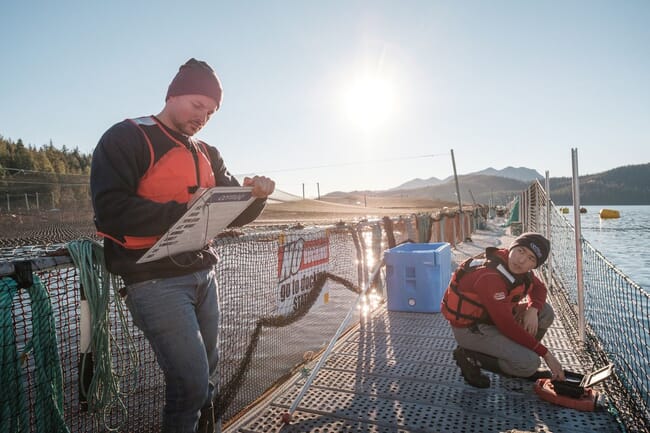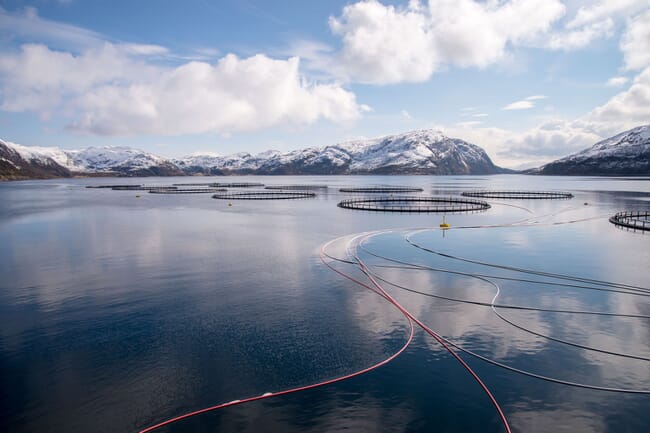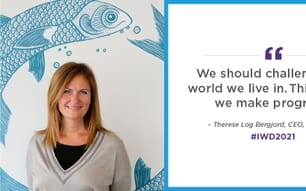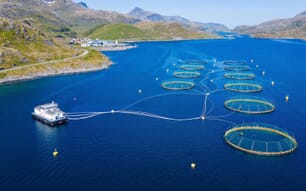
We are all too familiar by now with the impacts of Covid-19. In the food sector we have seen closed restaurants, tumbling profits, supply chains being put under pressure and the fear of transmission either by food or on the farms or in production facilities. So, there’s no doubt that a crisis like the Covid-19 pandemic forces companies to focus their attention on the now.
But the pandemic has also bought the longer-term risks we face into sharper focus – some say an exercise run for the food system on the harsh threats of climate change. Which is why the Global Salmon Initiative (GSI) members have lifted their eyes beyond the immediate horizon and kept sustainability commitments top of the agenda. Let me explain.
Compounding existing challenges in our food system
According to the latest State of Food Security and Nutrition in the World, in 2018 about 820 million people went to bed hungry and a third of all people lacked essential nutrients. At the same time, 600 million people were categorised as obese and 2 billion overweight because of imbalanced diets, which were also associated with obesity, diabetes, cancer, and cardiovascular diseases that compromise immune health. Today, immuno-depressed and malnourished people worldwide are disproportionally suffering the lethal consequences of Covid-19. We must therefore improve access, and availability of nutritious diets.
So, while we need more food, and more distribution of food, food production is also one of the main contributors to greenhouse gas emissions (GHGs), releasing more than a quarter of all global GHGs. Some might say aquaculture is well positioned to respond to both these challenges. Farmed fish is both a nutritious source of food, and one of the most eco-efficient forms of protein production. Yet we would be foolish to feel complacent.
The pandemic highlighted that are food systems are more vulnerable than we realised. From exposing the consequences of a global system highly dependent on transport, to limits on people on farms, from food shortages to oversupply in others (beer being poured away is a crime), and now potentially millions of people being thrown into food insecurity. Climate change will send the same shockwaves across the food system – droughts and floods devasting crops, and rising sea levels and changing oxygen levels impacting ocean farms. We have for some time understood the threat we face from these challenges, and Covid-19 has given us realtime experience of what this kind of disruption can do.

Building resilience and managing change
When challenges occur, especially as significant as Covid-19, it is human nature to worry only about meeting our most immediate needs. But the skills, attitudes and cultures needed to survive a crisis are the same as those needed for longer-term adaptation. Resilience comes with the acceptance that change is our responsibility, and a crisis only differs from the everyday because it forces us to act faster.
We have seen that the companies that have previously done a good job thinking through ESG strategy are in a better position to emerge more resilient from the Covid-19 pandemic, because they are used to framing their choices through the lens of critical risks and stakeholder perceptions. And the same will be true for climate change, the more we act now and integrate ESG principles into the foundations of our business, the more resilient we shall be to manage the change.
We have known for some time that our future as an industry depends on rapid, continuous improvement in our environmental and social performance, and maintaining our credentials as an exceptionally healthy food choice. That is and should be our unchangeable path forwards, and while Covid-19 creates some short-term hurdles it cannot distract us off track.
Acting now
Which is why in the midst of a global pandemic, while it may not have seemed like the usual time to commit to new ambitious projects, the GSI members decided to launch a new project in partnership with the World Wildlife Fund (WWF) to create a first-of-its-kind reporting framework on climate impact. Collecting information on climate impact across the production chain will be the first step in providing the necessary information to ensure we are not only aware of our performance but can also find ways to mitigate our impact and ensure farmed salmon remains one of the most climate-efficient forms of protein available.
Scientists and health advocates, and by now I imagine most of us have seen the Ted Talk by Bill Gates, have long said that a pandemic was inevitable. But the world did not prepare, and now we are feeling the consequences and trying to make up for lost time. Which is why we should see Covid-19 not as a time to take our foot off the gas on climate commitments, but instead as a cautionary tale. If we focus on understanding what changes are needed now, start developing the necessary innovations and continue to build momentum, we can hopefully avoid making the same mistake with climate change.
So, as we continue to grapple with the ongoing impacts of Covid-19, of course we have to shift priorities and adapt to survive the now; but as the pandemic has shown us the more we collect data, collaborate to find solutions and turn to innovations, business and food systems are resilient. There is no denying we face common, global challenges that we must solve through common, global solutions. And, as we’ve seen in the pandemic, a coordinated global effort is what is needed to have an impact. Which is exactly why we must work together to achieve our sustainability and climate commitments, and why groups such as GSI, and many other multi-stakeholders, will be catalysts in doing so.





